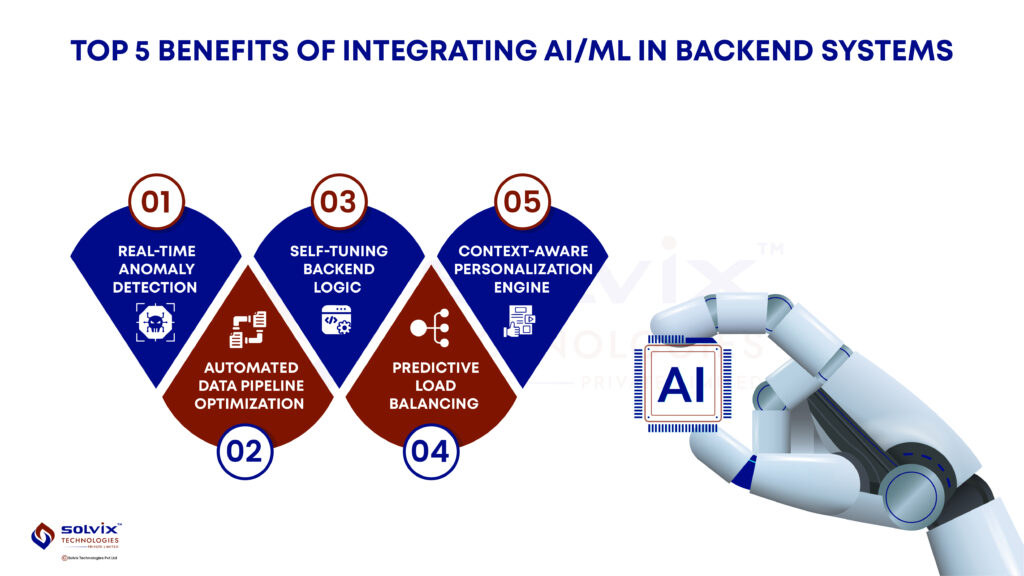No products in the cart.
Integrating AI and Machine Learning in Backend Systems
Artificial Intelligence (AI) and Machine Learning (ML) have transitioned from niche innovations to core components within backend systems, enhancing efficiency, scalability, and user experience. For businesses aiming to stay competitive, partnering with a proficient backend app development company becomes crucial. Here, we explore why and how integrating AI and ML into your backend systems significantly elevates your digital solutions.
What is AI and ML Integration in Backend Development?
AI and ML integration in backend systems involves embedding intelligent algorithms capable of learning from data patterns and automating complex backend tasks. These backend technologies for web development enable dynamic responses, proactive system management, and optimized resource allocation. From personalized user experiences to intelligent predictive analytics, the scope is expansive.
Moreover, integrating AI and ML also empowers backend systems with advanced capabilities such as natural language processing (NLP), computer vision, and anomaly detection. These functionalities enable businesses to derive meaningful insights from unstructured data, automate complex decision-making processes, and enhance overall system responsiveness and adaptability.
Why Should Your Business Integrate AI and ML into Backend Systems?
Enhanced Data Management
Backend systems handle massive datasets crucial for business decisions. Integrating AI streamlines data handling by automating data classification, cleansing, and structuring. This ensures data integrity and reduces manual intervention, significantly boosting productivity.
Improved User Experience (UX)
AI-driven backends can analyze user interactions, preferences, and behavior, allowing your backend development services to create personalized, engaging experiences. Predictive analytics helps anticipate user needs, reducing response times and enhancing overall satisfaction.
Increased Operational Efficiency
ML algorithms facilitate automated task handling and predictive maintenance, reducing system downtime and operational costs. Backend systems empowered by AI can detect anomalies, automate troubleshooting, and ensure continuous operational uptime.
How to Integrate AI and Machine Learning into Backend Systems?
Following are the steps explained in detail below –
Identify Business Objectives Clearly
Before implementation, define clear objectives—whether it’s user personalization, predictive analytics, or automation. A precise goavvl ensures the AI and ML solutions are correctly aligned with your business requirements and backend technologies.
Select the Right Backend Technologies
Choosing suitable backend technologies for web development is foundational. Python, Java, Node.js, and PHP are among the most adaptable languages for AI and ML integration, each offering libraries and frameworks tailored for intelligent applications.
Data Collection and Preparation
High-quality data collection and preparation are critical. Your backend development services should emphasize robust data pipelines to ensure accurate and reliable AI outcomes. Proper data preprocessing—cleaning, labeling, and structuring—ensures your ML algorithms perform optimally.
Model Development and Training
This stage involves selecting appropriate ML models, training them on your datasets, and fine-tuning parameters for maximum accuracy. Partnering with an experienced backend app development company ensures your models are scalable, efficient, and ready for deployment.
Deployment and Continuous Monitoring
Once trained, models are integrated into the backend infrastructure. Continuous monitoring is essential to manage model drift and maintain system accuracy. Regular updates based on new data ensure the system remains relevant and efficient.
Real-world Applications of AI and ML in Backend Systems

Predictive Analytics and Forecasting
Backend integration of predictive models helps businesses anticipate market trends, customer behavior, and resource needs, enabling informed strategic decisions.
Customer Service Automation
AI-powered chatbots integrated with backend systems provide instant support, manage queries efficiently, and improve customer satisfaction.
Fraud Detection and Security
AI-enhanced backend systems detect fraudulent activities and enhance security by identifying suspicious patterns in real-time, securing sensitive information effectively.
How to Choose the Right Backend App Development Company
Selecting a knowledgeable backend app development company is vital. Look for proven expertise in integrating AI and ML solutions, demonstrated by portfolio projects, client testimonials, and technical capability. The right partner ensures smooth integration, robust support, and continuous enhancement of your backend systems.
Conclusion
Integrating AI and ML within backend systems transforms traditional web applications into smart, adaptive, and highly efficient platforms. Businesses leveraging these technologies through competent backend development services will lead their industries, benefiting from enhanced operational efficiency, superior user experiences, and intelligent decision-making capabilities.
To enjoy these advantages, align with backend technologies that facilitate robust AI integration and choose a reliable backend app development company. AI and ML are not merely technologies of the future—they are essential tools for today’s competitive digital landscape.
